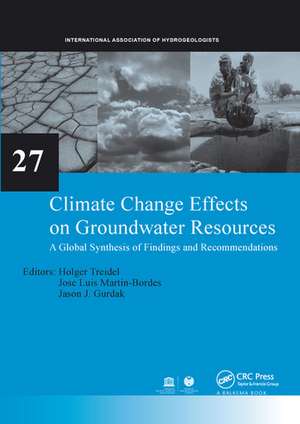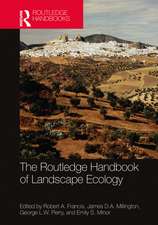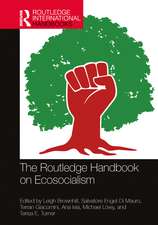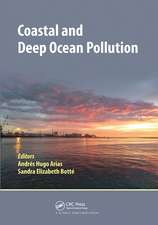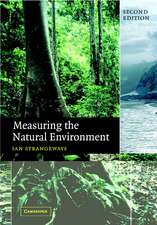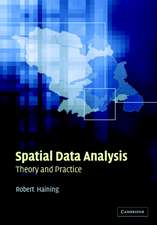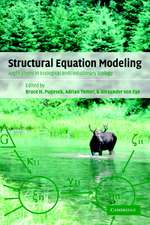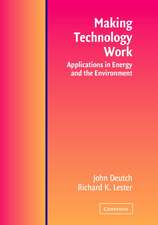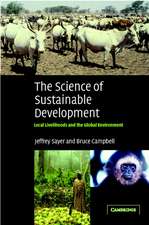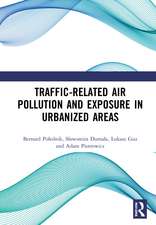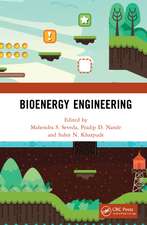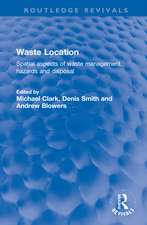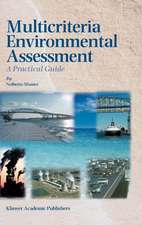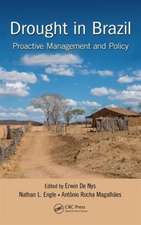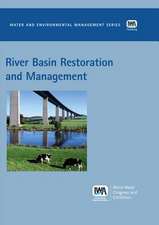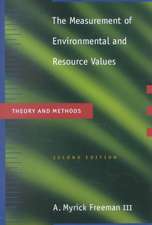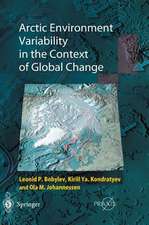Climate Change Effects on Groundwater Resources: A Global Synthesis of Findings and Recommendations: IAH - International Contributions to Hydrogeology
Editat de Holger Treidel, Jose Luis Martin-Bordes, Jason J. Gurdaken Limba Engleză Paperback – 30 iun 2020
Direct impacts of climate change on natural processes (groundwater recharge, discharge, storage, saltwater intrusion, biogeochemical reactions, chemical fate and transport) may be exacerbated by human activities (indirect impacts). Increased groundwater abstraction, for example, may be needed in areas with unsustainable or contaminated surface water resources caused by droughts and floods. Climate change effects on groundwater resources are, therefore, closely linked to other global change drivers, including population growth, urbanization and land-use change, coupled with other socio-economic and political trends. Groundwater response to global changes is a complex function that depends on climate change and variability, topography, aquifer characteristics, vegetation dynamics, and human activities.
This volume contains case studies from diverse aquifer systems, scientific methods, and climatic settings that have been conducted globally under the framework of the UNESCO-IHP project Groundwater Resources Assessment under the Pressures of Humanity and Climate Change (GRAPHIC). This book presents a current and global synthesis of scientific findings and policy recommendations for scientists, water managers and policy makers towards adaptive management of groundwater sustainability under future climate change and variability.
| Toate formatele și edițiile | Preț | Express |
|---|---|---|
| Paperback (1) | 445.99 lei 6-8 săpt. | |
| CRC Press – 30 iun 2020 | 445.99 lei 6-8 săpt. | |
| Hardback (1) | 939.36 lei 6-8 săpt. | |
| CRC Press – 2 dec 2011 | 939.36 lei 6-8 săpt. |
Preț: 445.99 lei
Nou
Puncte Express: 669
Preț estimativ în valută:
85.34€ • 91.26$ • 71.15£
85.34€ • 91.26$ • 71.15£
Carte tipărită la comandă
Livrare economică 18 aprilie-02 mai
Preluare comenzi: 021 569.72.76
Specificații
ISBN-13: 9780367576820
ISBN-10: 0367576821
Pagini: 414
Dimensiuni: 174 x 246 x 22 mm
Greutate: 0.69 kg
Ediția:1
Editura: CRC Press
Colecția CRC Press
Seria IAH - International Contributions to Hydrogeology
ISBN-10: 0367576821
Pagini: 414
Dimensiuni: 174 x 246 x 22 mm
Greutate: 0.69 kg
Ediția:1
Editura: CRC Press
Colecția CRC Press
Seria IAH - International Contributions to Hydrogeology
Public țintă
ProfessionalNotă biografică
Holger Treidel is an environmental scientist and works as project coordinator with UNESCO’s International Hydrological Programme in Paris. His work is related to the sustainable management of groundwater resources under the effects of climate change & variability, with particular focus on the complex challenges related to the management of transboundary aquifer systems. He is coordinating the UNESCO project Groundwater Resources Assessment under the Pressures of Humanity and Climate Change (GRAPHIC) and global and regional transboundary groundwater management projects in cooperation with the Global Environmental Facility (GEF).
Jose Luis Martin-Bordes is a civil engineer specialized in groundwater resources management and works as project coordinator in the International Hydrological Programme (IHP) within the Division of Water Sciences of UNESCO, Paris, France. He provides support to the coordination of the IHP Groundwater activities including the Groundwater Resources Assessment under the Pressures of Humanity and Climate Change (GRAPHIC), the International Shared Aquifer Resources Management Initiative (ISARM), Groundwater Dependent Ecosystems and Groundwater for Emergency Situations (GWES).
Jason J. Gurdak is Assistant Professor of hydrogeology in the Department of Geosciences at San Francisco State University, California, USA. He and his research group address basic and applied questions about sustainable groundwater management, vadose zone and soilwater processes that affect recharge and contaminant transport, groundwater vulnerability to contamination and climate extremes, and the effects of climate change and interannual to multidecadal climate variability on water resources. Since 2004 he has served on the UNESCO project Groundwater Resources Assessment under the Pressures of Humanity and Climate Change (GRAPHIC) that promotes science, education, and awareness of the coupled effects of climate change and human stresses on global groundwater resources.
Jose Luis Martin-Bordes is a civil engineer specialized in groundwater resources management and works as project coordinator in the International Hydrological Programme (IHP) within the Division of Water Sciences of UNESCO, Paris, France. He provides support to the coordination of the IHP Groundwater activities including the Groundwater Resources Assessment under the Pressures of Humanity and Climate Change (GRAPHIC), the International Shared Aquifer Resources Management Initiative (ISARM), Groundwater Dependent Ecosystems and Groundwater for Emergency Situations (GWES).
Jason J. Gurdak is Assistant Professor of hydrogeology in the Department of Geosciences at San Francisco State University, California, USA. He and his research group address basic and applied questions about sustainable groundwater management, vadose zone and soilwater processes that affect recharge and contaminant transport, groundwater vulnerability to contamination and climate extremes, and the effects of climate change and interannual to multidecadal climate variability on water resources. Since 2004 he has served on the UNESCO project Groundwater Resources Assessment under the Pressures of Humanity and Climate Change (GRAPHIC) that promotes science, education, and awareness of the coupled effects of climate change and human stresses on global groundwater resources.
Cuprins
1 Introduction Tropical Climates 2. The impacts of climate change and rapid development on weathered crystalline rock aquifer systems in the humid tropics of sub-Saharan Africa: evidence from south-western Uganda 3. Groundwater recharge and storage variability in southern Mali 4. Groundwater discharge as affected by land use change in small catchments: A hydrologic and economic case study in Central Brazil 5. Effects of storm surges on groundwater resources, North Andros Island, Bahamas 6. Reducing groundwater vulnerability in Carbonate Island countries in the Pacific Dry (Arid and Semiarid) Climates 7. Groundwater resources increase in the Iullemmeden Basin, West Africa 8. Climate change and its impacts on groundwater resources in Morocco: the case of the Souss-Massa basin 9. Vulnerability of groundwater quality to human activity and climate change and variability, High Plains aquifer, USA 10. Groundwater change in the Murray basin from long-term in-situ monitoring and GRACE estimates Temperate Climates 11. Impact assessment of combined climate and management scenarios on groundwater resources. The Inca-Sa Pobla hydrogeological unit (Majorca, Spain) 12. The effect of climate and anthropogenic sea level changes on Israeli coastal aquifers 13. Land subsidence and sea-level rise threaten fresh water resources in the coastal groundwater system of the Rijnland water board, The Netherlands 14. Climate change impacts on valley-bottom aquifers in mountain regions: case studies from British Columbia, Canada 15. Possible effects of climate change on groundwater resources in the central region of Santa Fe Province, Argentina Continental Climates 16. Impacts of drought on groundwater depletion in the Beijing Plain, China 17. Possible effects of climate change on hydrogeological systems: results from research on Esker aquifers in northern Finland Polar Climates 18. Impacts of climate change on groundwater in permafrost areas: case study from Svalbard, Norway Various Climates 19. Groundwater management in Asian cities under the pressures of human impacts and climate change 20. Evaluation of future climate change impacts on European groundwater resources 21. Sustainable groundwater management for large aquifer systems: tracking depletion rates from space 22. Major science findings, policy recommendations, and future work
Descriere
Groundwater response to global changes is a complex function that depends on climate change and variability, topography, aquifer characteristics, vegetation dynamics, and human activities. This book synthesizes the current state of knowledge, methodologies, and scientific approaches for assessing climate change effects on groundwater resources a
